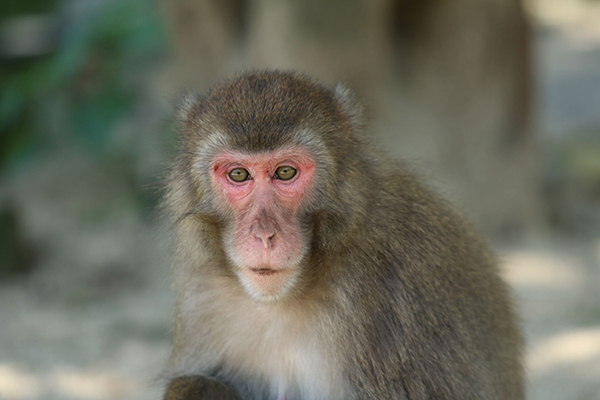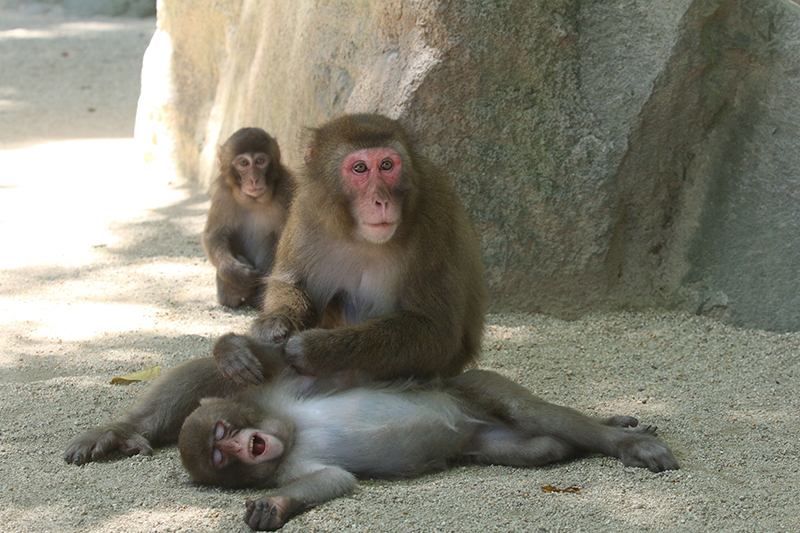Japan monkey queen
Like humans, monkeys have a male-dominated society. However, one female macaque (muh-cawk) from the Takasakiyama Natural Zoological Garden has proven herself to be “not like other girls” – she’s the first female alpha monkey in Japan.
Origins of the monkey queen

Image credit: Takasakiyama Natural Zoological Garden
Yakei is a 9-year-old female Japanese macaque that resides in the Takasakiyama Natural Zoological Garden in Beppu, Japan. She is also the current alpha of her troop of macaques dubbed “Troop B”. The troop consists of 677 monkeys, and Yakei is their first female leader ever.
Yakei’s climb to the top surprised many of the observing scientists and researchers in the reserve.
According to an email sent to the New York Times by Yu Kaigaishi, a researcher from the Japan Society for the Promotion of Science, a hostile takeover by a female is extremely rare in the Japanese macaque society.
The Japanese macaque, or the snow monkey, originates from Japan and is an unusually intelligent species. They are easily identified by their bright red bottoms.
Japanese macaques function with an extremely strict social hierarchy, with the strongest males dominating the top few spots; one’s rank in the troop determines one’s access to food, mates, and safe resting spots.
Upon reaching puberty, male macaques will leave the troop they were born into and join a new troop, where they will slowly make their way up the ranks.
Female macaques hardly ever leave their original troop and will instead usually attain a rank just below that of their mothers.
However, Yakei is no common monkey.

Yakei after a scuffle with another monkey.
Image credit: Takasakiyama Natural Zoological Garden
In April 2021, she fought her own mother in order to attain the top female position of her own troop. Instead of resting on her laurels, Yakei proceeded to launch attacks on 3 of the high-ranking males in her troop.
After the successful attacks, Yakei then targeted her troop leader Nanchu, a 31-year-old male monkey who had led the troop for the past 5 years.
Being more than 3 times Yakei’s age, Nanchu was physically weaker and hence easily defeated by the spirited young female.
Yakei started displaying typically male behaviour such as walking with her tail pointing upwards and using her body to shake tree branches. These are aggressive traits usually seen in dominant adult male macaques.
The zoo staff did something called a “peanut test” in order to confirm Yakei’s ascension to alpha status. The test entails giving the monkeys peanuts and observing who gets to eat first.
Upon presenting the peanuts, the rest of the troop stepped aside and waited for Yakei to approach and eat first, thus confirming her newly attained alpha status in the troop.
Trouble in paradise
Though she’s now the alpha of her troop, Yakei still has problems to face.
Mating season is coming up and that could very well spell disaster for Yakei.
During macaque mating season, the monkeys form temporary pair bonds with each other. They then spend approximately 16 days with their partner, feeding, resting, and travelling.
After this period, the relationship ends and the females leave to seek out new partners. Female macaques have an average of 4 male partners each breeding season.
Previously, Yakei mated with a high-ranking male called Goro. They first started having relations in 2019, when Goro bit Yakei in the face and she accepted him as a mate.
However, Goro seems to show no inclination towards mating with Yakei after she became the alpha.
Of course, Yakei has suitors aplenty. An 18-year-old male macaque named Luffy has been chasing after Yakei. Unfortunately, our queen doesn’t seem to be interested in him.
Luffy’s affection seems to be scaring Yakei – Mr. Kaigaishi observed that in Luffy’s presence, Yakei had an expression that is usually reserved for lower-ranked monkeys.
Additionally, Yakei was pushed aside by Luffy in their quest for food – this behaviour is typically reserved for one’s subordinates, not one’s alpha or potential mate.
The researchers are all eagerly awaiting further developments in order to ascertain if Yakei’s alpha position is on the rocks, or if she just really doesn’t like Luffy. If the latter is the case, we get it girl.
One of the staff at the zoo, Satoshi Kimoto, said in an email to the New York Times that he doesn’t believe that Yakei will fall from her position as alpha during the mating season.
Long live the Japanese macaque monkey queen
Power struggles, be it in the Japanese macaque society or our human world, are turbulent and rarely welcome. But no matter what happens in the zoo, we will always support Yakei, our monkey queen.
Also check out:
- Monkey park in Japan lets macaques soak in onsen
- Japanese capybara wins competition for longest onsen soak
- “Miracle” gorilla poops out oranges given by Japan monkey centre
- Fishmallows gain popularity as a BBQ item in Japan
- Tokyo’s “good luck tuna” not so lucky in the face of the pandemic
Cover image adapted from: Takasakiyama Natural Zoological Garden

Drop us your email so you won't miss the latest news.






